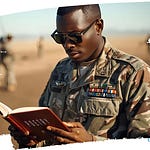Are you or have you ever been a boss or been someone who has a boss? Chances are, the answer is yes. If so, then this series of essays is for you.
Way back in March 2021, a Twitter user who goes by “Angry Staff Officer” (@pptsapper) posted a pithy and insightful list of “Rules for Army Leaders.” As I am sure you have already surmised, these rules, though specifically addressed to Army leaders, readily apply to any military leader, such as Navy leaders or Space Force leaders (though Space Force rucksacks may be weightless), but did you guess that they also apply just as well to any leader in any walk of life, including civilian bosses?
Over five consecutive weeks we will continue to take a look at each of these rules in turn and apply them to your experience with daily bossing, be you a bosser or a bossee.
Rule 4
Knowing When to Leave Is More Valuable than Never Quitting
A Narrative Written in the First-Person Dysfunctional Voice
They say you always remember your first time.
Do you remember the first time you chose to quit something? I remember mine.
I was in fifth grade when it was announced that some local boys track team was looking for runners. I have never been much of an athlete, but my big brother was. I guess I wanted to be more like him, but I was a small kid and young for my grade. I may not have cut an impressive figure, but I was pretty fast. When we played tag in the schoolyard, I could evade being “it” effectively, much to the frustration of my older, bigger classmates. When we raced, the longer-legged kids could beat me, but not by much.
So, track, why not? I loved to run. Running was fun. What could ruin running?
I went to the first evening practice in a park by the school and had the distinct impression that I had missed a few meetings. The coaches (I have no idea who these guys were) had already divvied the boys into the runners and the others. The head coach was a crotchety old guy with a stogie and a hip flask named Cranky McGrump. Okay, perhaps my memory is embellishing one or two details, but you get the idea. He was not a people person, which may be why he chose to hang around a bunch of preteen boys. After a half glance at my skinny frame, he banished me to go stand with a handful of kids far away from the actual runners.
My small group consisted of the non-athletes, the youngsters, the wiry small kids, the nerds, the losers. We weren’t JV. The JV kids were with the runners, the older kids, the tall kids with antelope legs and an athletic bearing, the ones that looked the part.
The coaches put the real runners through several drills before they remembered my forlorn group. One luckless young coach, Short Straw we’ll call him, was assigned to work with us. Coach Straw had us run a few sprints to see what we could do and showed admirable restraint by refraining from burdening us with any hint of actual coaching or commentary or enthusiasm. Then he set us up for a half-assed relay. After a few minutes of this, he had had enough and abandoned us to continue our awkward standing around. We never had a chance.
Over the next weeks, Short Straw led us in a few more lame practices, which always consisted of a single, non-competitive relay. This method meant we each got in a bit of a practice run before he turned back to the real athletes. The only instruction we ever received was on how to pass the baton, which Coach Straw had us drill a lot.
At some point I was handed a uniform kit of shorts and a tank top. That made it official I suppose, but the whole affair was disheartening. Quitting, though, was not on the table. It was a matter of commitment, or so my well-honed fifth-grade sense of pride told me.
Finally the day of our first meet arrived. The head coach, Cranky McGrouch, asked if any of our parents could drive, and I guess I volunteered my mom to carry a load of kids to some school track.
The meet was awkward and uninteresting. We sat together as a team, but the difference in status was evident even in how we piled onto the bleachers. The athletes clustered together close to the track, supporting each other and showing off despite the fact that they performed poorly.
In the meantime, my little group sat up at the top of the bleachers goofing off, barely engaged in the proceedings and more interested in the thrilling crack of the starter pistol. Toward the end of the meet when we were longing to go home, old Crusty McGrump, the head coach, chomping on his stogie, suddenly called my name in his best Burgess Meredith voice: “Rocky!” He clearly had no idea who I was as he scanned the bleachers, and he certainly had never once seen me run. I raised my hand, and he told me to get into the next relay.
I had worn jeans over my shorts against the fall chill and struggled to pull them over the white hightop All Stars I stupidly had not removed. A couple of my fellow outcasts had to help me defeat my pants. We wondered why I was the only one of us who was selected to run, and they concluded, wisely, that it was because my mom drove, which obligated Old Crabby to have me appear in an event. Full of all the enthusiasm that revelation inspired I stumbled onto the track for the first time in my life.
The other runners on my relay team were all athletes, of course, and had had some instruction in stretching and running. For my part, I had learned my single lesson well. I knew how to handle the baton. Someone directed me toward the third leg of the relay where I could do the least damage to the team’s chances.
As we got into position, Mr. McGripe, Short Straw, and the other coaches offered advice to my fellow relayers. No one said a word to me. My role was clear. Don’t fall down and don’t drop the baton.
The pistol fired, and the relay began—my first competitive race. I watched anxiously as the baton loped relentlessly closer.
I prepared for the transfer as my teammate lurched toward me, but he loosened his grip on the baton too soon, which made it droop before it reached my outstretched hand. It was a rookie error if there ever was one, and his sloppy delivery cost me a moment before I could secure the baton. As luck would have it, all my intensive practice in baton handling gave me the wherewithal to recover from his blunder.
And I ran. As best I could I ran. I had no technique. I had no preparation. I had no idea what to do or even where to look. I just ran. Hard. Wanting to do my best to support a team that had done nothing but fail me. All I had was instinct and spirit and a stupid baton, which, by the way, was significantly more solid than the one we practiced with. I realized then that our practice baton was probably just a piece of broom handle wrapped in tape.
By the time I passed the baton to the next runner, cleanly by the way, I just wanted to go home. I had put more heart into this race than this team would ever deserve.
After the race, which we lost, the athletes in the lower bleachers started loudly asking who “that kid in he middle” was who “lost ground” and cost them the race. They meant me. I was solely to blame for that one loss even though none of them had won a race all day. My fellow outcasts assured me that I did fine, but I wanted to cry. I found my mother in the stands, and she comforted me, saying that I had held my own.
None of the coaches, not old Crankshaft or even Mr. Straw, so much as looked at me after that. As far as they were concerned, my mother had provided transportation for some kids and had gotten to see her wimpy son run. Transaction complete.
A few days later, it was time for our next practice in the evening after dinner. I was sick to my stomach with anxiety, and I sat there picking through my food. My parents wanted to know what was up, and I told them, in my best fifth-grade articulation, how much I hated being on that track team, what a horrible experience it was, how humiliating and pointless. They had had no idea, so I guess I had hid it well. My mom asked, “why don’t you quit?”
What an absurd question. “I am not a quitter,” I declared, looking to my dad for support.
My dad was no good. He stated flatly, “if you are so miserable and hate that track team so much, just quit.”
I could not believe my ears. Quitters! I came from a family of quitters! So far as I was concerned I had never quit anything! Who were these people?
My parents persisted, though, and I must admit that the idea grew on me—rapidly. I went and gathered my little track kit, and my dad drove me to the park where we practiced. We arrived a little late since it didn’t matter now.
I guess to preserve a semblance of self-respect, I chose to do the deed myself. I walked up behind Coach McGruff as he presided over the runners. I could see my fellow outcasts in the distance as usual, tossing the baton back and forth for entertainment. I would not miss their company. I was nervous, tears welling in my eyes. It was scary to quit. I called Coach McGrinch’s name, and he turned on me. I am sure I heard the liquid in his hip flask slosh. He stared at me with incomprehension and was clearly wondering who this little boy was.
I told him bluntly that I was quitting and handed him the uniform.
I wish I could say he was gracious. Hell, I wish I could say he was contemptuous. I wish I could say he insulted me, called me a quitter, berated my cowardice. Instead, he silently accepted the uniform with perfect indifference. I was nobody, and this was nobody’s uniform once and again.
Despite the final indignity of old Cranky McGrump’s apathy and despite the humiliation and despair I felt as I handed him my kit, the instant I spun around to head back to the car, my tears dried and my heart lifted. A great weight rose from my shoulders on angel wings and fluttered into heaven forever. I could make out the distant chords of a celestial chorus, and the warmth of the sun poured over me despite the fact that it was a brisk autumn evening. I was giddy with relief, the first time I ever felt such a pure release as a full rainbow appeared in the cloudless sky, not with the normal eight colors but with nine or ten. I swear I spied a band of chartreuse and maybe magenta among the rest.
In that moment, I realized that sticking it out in such a dismal situation held no virtue. There was nothing on that team for me, no character to build nor any chance to really run. We didn’t even have a decent baton.
I learned then that quitting is neither good nor bad in itself. Knowing when to quit, though, is a vital skill and a great virtue. I have not always recalled this lesson perfectly, having stubbornly stayed with hopeless situations far too often. Still, whenever I have applied it, I have avoided much heartache and wasted time. As a fifth-grade track washout I imbibed perhaps my first bit of life wisdom. It is better to choose to walk away than to stick with the misery of never quitting.
Next Thursday: Rule 5, “Always train your replacement since you will be replaced.”
Query of the Week
The Quitter’s Challenge
When was a significant time you quit? What were the results?
Share your thoughts on this topic or participate in a discussion by leaving a comment below or by contacting me directly by email:
Let me know what you think. I welcome your comments and questions.
Please click on the button below or, if you prefer, email me at jim@jimsalvucci.com.
Post this essay on social media or send it by email to someone you want to intrigue/annoy.
Subscribe to receive my weekly newsletter and special editions directly to your mailbox.
You can improve your ability to achieve your mission of your organization.
Visit my website and reach out to me to learn how.















